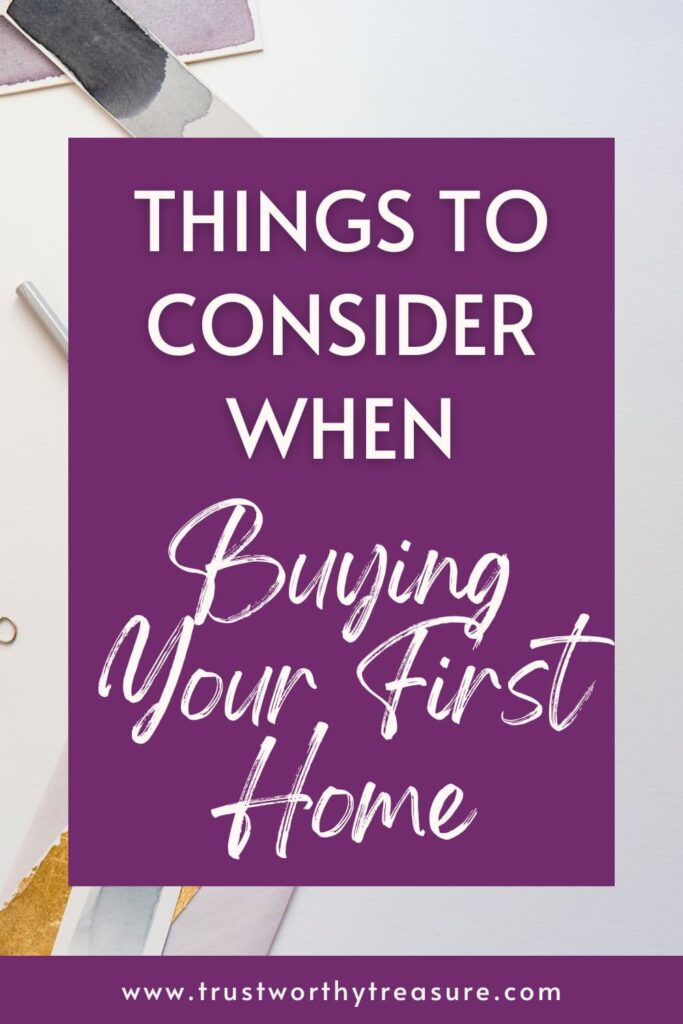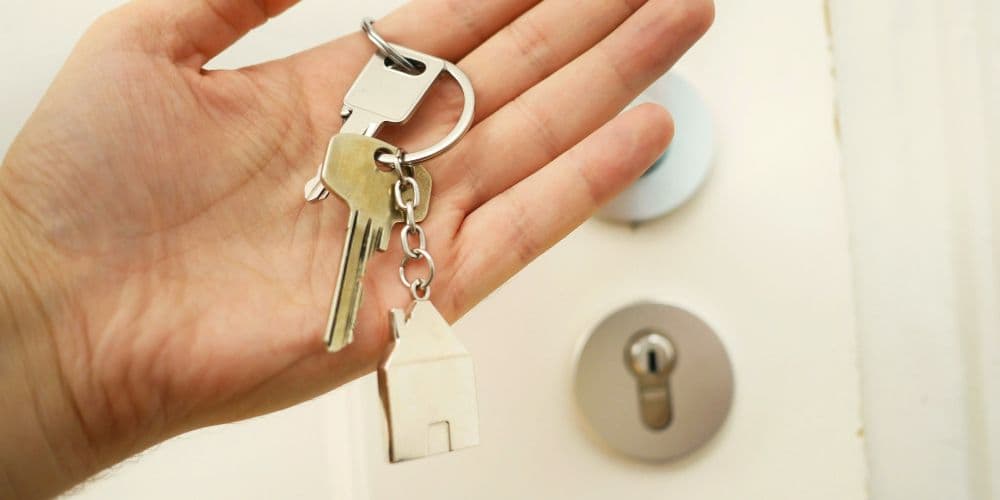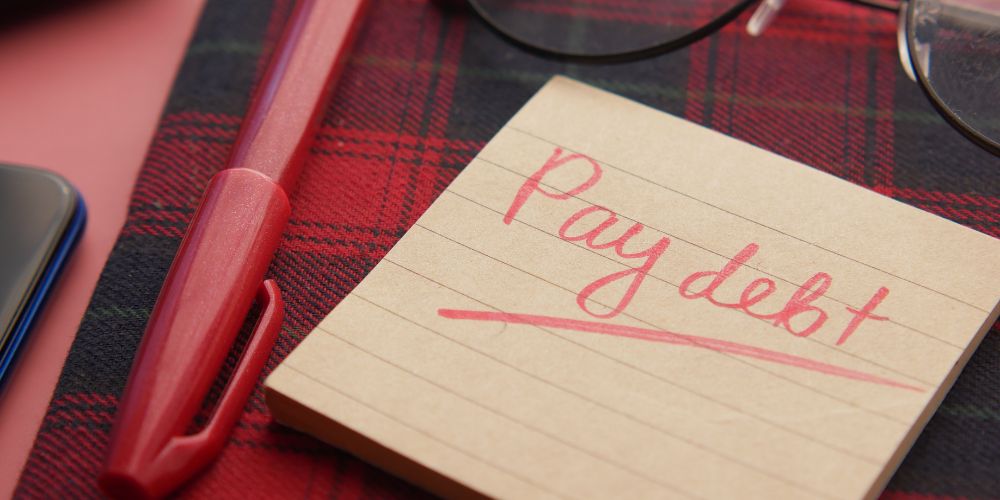Many people dream of owning their own home. Maybe you are renting and tired of the restrictions. Maybe you feel like you are “throwing your money away” at rent.
While I do think it is generally a good goal to own your home, it’s easy to focus on the dream and forget that it can be expensive.
Here is a breakdown of things to consider before buying a home.
You Have to Determine your Budget
It’s so important to set your budget for your mortgage payment. The lender is not considering your goals and dreams. They only look at the numbers of how much debt you currently have and what you currently earn.
Future changes in income are not considered when you are getting a mortgage. So if you plan a career change, or for a a parent to stop work to stay at home with the kids, you will have to determine what you can afford down the line.
Before getting a pre-approval for a loan, create or evaluate your budget. While you can buy a house for a small down payment (I’ve heard as low as 3-5% in some cases), you will save a lot of money over the life of the loan if you can save up a bigger down payment.
What is the most your monthly payment will be?
While your monthly mortgage payment itself may be less than the rent you are paying currently, you will have many other expenses.
Added Monthly and House Maintenance Expenses
Additional Utilities
When you rent, many utilities are either wrapped up in the price of rent or partially covered by the landlord.
When you own your house, you have to pay for everything. In addition, your house is probably bigger than whatever place you were renting, so your utilities will likely be higher than what you used to pay.
Yard Work
This is usually maintained by the landlord when you rent. When you buy a home, you have to mow the grass (and buy a lawnmower), weed the garden beds, remove dead trees, trim trees, etc.
This can add up! While a lot of these costs may not be immediate, it is good to consider the yard when buying a home.
If something goes wrong and you have to call in an expert
We had some plumbing issues soon after moving in and had to call a plumber. It’s hard to know when issues arise, but it can be the day you move in or a year later.
In any case, it’s good to consider that issues will arise and that these come with additional costs.
Appliances
Houses often come with appliances, but they may not work very well. Our washer broke when we bought our house so we had to use a laundromat for a while. Thankfully, our new neighbors had a washer and dryer they needed to get rid of so we got these for free!
HOA Fees
If you move to a neighborhood with an HOA, you will need to account for this in your monthly budget.
Determine potential other costs in the house-buying process
Closing costs
These days, it may be a bit much to ask the owners to cover closing costs. This is usually 2%-6% of the loan amount. There are a lot of factors in closing costs. This article includes a calculator.
Home inspection
This will likely cost you a few hundred dollars. While it may not be a huge expense, it is yet another expense to add to the pile!
A home inspector will give you a report of the state of things in the house. It pretty much explains what is wrong and will need fixing.
Earnest money
This is a certain amount of money that you have to pay when you put the offer in on the house. It does go toward the cost of the house if the sale goes through.
Again, while it may not be a large amount of money, it is money that you will need to have available when you make your offer.
Research any other costs
Depending on where you live or the type of property you want to purchase, there may be other costs involved.
This is not an exhaustive list but should get you started on determining a budget for your mortgage.

Determine potential other costs in the moving process
These expenses may not be that big in the context of your overall move, but they will add up!
Moving truck
If you are planning to do the moving yourself, you will likely still have to rent a moving truck.
Moving company
This is likely one of the biggest expenses in the moving process if you decide to go this route.
Storage unit if you will be between places for a time
If you have to find in-between housing or are moving to a bigger place but need a place to put items you are collecting, you may need to rent a storage unit for a time.
Cleaning supplies/cleaning services
You will probably need to clean your existing place as well as your new home. It’s cheaper to do this yourself but is stressful on top of moving.
Determine potential other costs immediately after buying your house
When we bought our house, we made a list of things we wanted or needed to fix and put it in order of priority. While nothing was urgent, we wanted to start on some things very soon after moving.
What do you want to fix up?
Painting walls
You’ve probably been dreaming of creating a space that matches your style.
This is a great way to accomplish that vision. While some people prefer to hire painters, I decided to paint the rooms myself. I enjoy painting projects and this saved a lot of money.
cleaning/replacing flooring
The best time to do this is generally before you move your stuff into a space. However, if you are replacing flooring this can be a big expense on top of a new move.
Depending on your budget, it may be best to wait to overhaul any floors.
Any furniture you need/want to buy
If you’re a first-time home buyer, you are probably also moving up in the amount of space you will be living in. Sometimes you need more things to better utilize the space.
I didn’t buy much right after moving because we already had a lot of furniture.
In general, I think it’s better to wait until you find the right furnishings for your house than rushing to fill it up. Sure, there may be items that are necessary in the short run, but it’s so satisfying to find the right pieces.
Cleaning
This is likely the highest priority item when moving. Whether you’re buying household cleaners or paying for a professional cleaning service, it can add up.
If your window to move is tight, it may be worth it to you to hire someone who can focus on cleaning your new place instead of worrying about it among all the other details.
However, it is indeed another expense on top of the biggest purchase you have likely ever made.

Shop for a mortgage
Rates are going to generally be pretty close, but there can still be variation – However, you may luck out with not having to pay Private Mortgage Insurance (PMI) if a lender or bank has a lower threshold.
We went with a bank with the lowest interest rate but higher closing costs compared to the other places we looked. However, it also had a lower threshold for PMI (15% down instead of 20% like most places)
Although it was more money up front, it was going to be a lot less money over the life of the loan
May have lower closing costs – but look at the total cost of everything. You can figure this out pretty quickly with a loan calculator/ mortgage payoff calculator online.
A lot of places will advertise low closing costs for a variety of reasons. This is great in the short term but look at the over cost over the life of the loan.
A 15-year mortgage is going to cost a lot less than a 30-year mortgage just like putting 20% down will cost a lot less than putting 2% down.
Private Mortgage Insurance
Private Mortgage Insurance (PMI) is essentially insurance the bank makes you get to make sure you will invest in paying back your loan. There is no benefit to you.
I’ve heard a lot of talk about PMI not being a big deal, and while it’s not a huge monthly expense, it is still money that adds up that is not investing in your life.
When working out your budget for buying a house, consider the down payment threshold for PMI in the context of the life of the loan.
PMI typically “falls off” your loan when you reach 20% of your principal paid.
Credit Score
Shop lenders in your area. In my experience try a local bank, a national bank, a mortgage lender, and a credit union
Once you have all the docs together, it’s pretty simple to shop for different lenders.
If you get pre-approvals from different financial institutions within a 2-week period, it is considered one pull on your credit report. So, while getting pre-approvals will have an effect on your credit score, getting multiple in a 2-week period will have the minimum effect.
It can take a bit of time calling all these places and setting appointments in within a 2-week period, but it can be the difference of thousands of dollars over the life of the loan.
A lot of people/articles I’ve read over the years put a lot of weight on the credit score. While it is important in getting a mortgage (though there is a way to get a mortgage without a credit score)
A credit score is only an indication of how well you pay back borrowed money. Other than a mortgage, you will have the most financial freedom if you do not carry debt.
Pre-approval
Set your budget
You don’t want your mortgage payment to max out your budget, or else the above expenses will put you further into debt.
Consider what your other financial goals and priorities are. If you want to make some big life changes, how will that affect your mortgage amount?
What is considered in your pre-approval?
Debt to Income Ratio – Just as it sounds, this is how much you make versus how much debt you have. I don’t know the formulas behind how this breaks down to your pre-approval amount.
However, the higher your income compared to your debt, the more you will be able to borrow for a mortgage.
Credit Score – This tells the bank how well you pay back borrowed money. It is much easier to get a mortgage if you have a (good) credit score, but it isn’t necessary.
Documents Needed for Pre-Approval
You usually need your most recent pay stubs and proof of identity. There may be additional documents needed for your pre-approval. Here’s a list of documents you may need.
Once you have all your documents scanned and a list of lenders you want to get pre-approval from, it’s just a matter of contacting the mortgage representative at each institution.
Again, it’s best to do this in a 2-week timeframe to have minimal impact on your credit score.
Personal Experience
We were approved for almost 3x what we had set our budget to be. We had other goals that took up a lot of our budget. If we had gotten a house at the upper end of what we were approved for we would not have been able to carry out our other financial goals.
We got a house that was at the upper end of our self-imposed budget (not our pre-approval) and we wanted to make sure we could afford it, if our employment made major changes.
Shop for insurance
Get quotes from several different places
This is something I should have done more of at the time. It’s easy to just set it and forget it with insurance, but I’ve been meaning to shop around for insurance again.
Some insurance companies will do a fairly thorough look through your property, while others will take the available information on the house and create a quote for a premium based on that.
How Long-Term Dreams and Goals Affect Your Budget for a House
What are your long-term goals that can affect your budget for a house?
Some things you should consider if you are planning to buy a house:
- Be a stay-at-home parent?
- Travel?
- Retire early?
- Specific activities for the kids?
Your income will probably go up by the time you pay off your mortgage, but we planned our mortgage around the amount we knew we would be bringing in.
If your income does increase, this can always go toward paying down your existing mortgage or upgrading later!
Starting with the end in mind
I think it’s possible to plan to pay off a mortgage in less than the typical 30 years. But, it ultimately comes down to planning and looking at your overall financial picture.
While we have a 30-year mortgage, we are on track to pay it off much earlier.
I understand the temptation to get a “dream house” but it can quickly become troublesome without enough planning.
We bought our house based on budget, location, and a few other factors. However, we quickly learned that there would be many other expenses that we just did not foresee.
Thankfully, our mortgage was well within our budget and we had planned for unforeseeable expenses so we did not have to take on any debt.
What is the most important thing you’re considering when buying a home?



